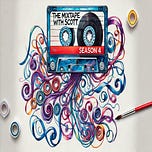Welcome to season 3 of The Mixtape with Scott! A podcast about the personal stories of economists and the collective story of economics of the last 50 years. We are kicking off season 3 with a bang: an interview with the distinguished labor economist, Richard Freeman, from Harvard University. Dr. Freeman holds is the Herbert Ascherman Professor of Economics at Harvard University and serves as the Co-Director of the Labor and Worklife Program at Harvard Law School. As you’ll learn, his educational journey started with a B.A. from Dartmouth in 1964 and went into a Ph.D. in Economics from Harvard University which he competed in 1969.
Freeman's work has been pivotal in reshaping perspectives on labor economics and industrial relations. His book "What Do Unions Do?" co-authored with James Medoff in 1984, challenged prevailing economic views by suggesting that unionism could enhance social efficiency. This groundbreaking work has been supported by subsequent studies, highlighting the positive impact of unions on productivity in various fields. Freeman has also made significant contributions to understanding the internationalization of science, the dynamics of the scientific workforce, and the implications of an overeducated American labor market.
This was a super fun and at times funny interview, and I hope you like listening to it as much as I had being in it. Thanks again for tuning in! Don’t forget to like, share, follow, etc.!















Share this post